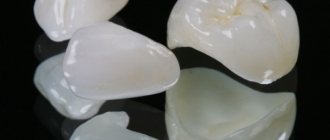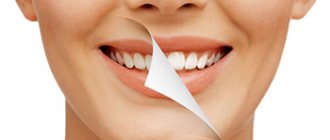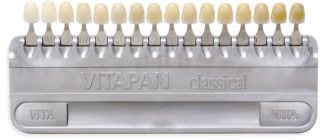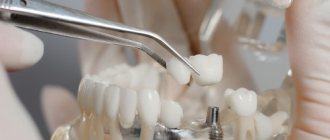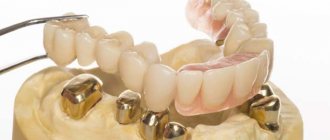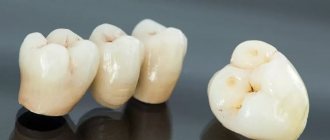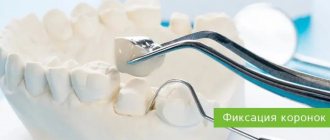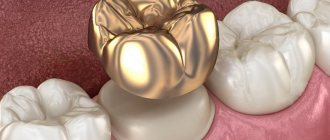Indications for the installation of porcelain crowns
The main indication for the installation of porcelain crowns is the aesthetic restoration of the front teeth:
· wedge-shaped defects and chips that cannot be eliminated using filling material;
Complete destruction of the dental crown;
· enamel hypoplasia;
Abnormalities in tooth color or shape;
· a pronounced change in the shade of tooth enamel that cannot be corrected using professional hygiene methods.
In addition, such designs are suitable for patients who are allergic to metal.
Price issue
When choosing between different materials, it is important to consider their cost. The question of how much a porcelain crown costs concerns many. The price of prostheses made from this material starts from 10 thousand rubles and reaches 20-30 thousand per unit including installation. Also take into account the costs associated with preparing for prosthetics - treatment of the abutment tooth, as a rule, always has to be paid separately.
Author: Chernov A. R. (Thank you for your help in writing the article and the information provided)
Stages of manufacturing and installation of porcelain crowns
First of all, at the appointment, the dentist examines the patient’s oral cavity, identifies possible contraindications, and, if necessary, carries out a complete sanitation. Only after this can you proceed to the next stage - preparing the tooth for a porcelain crown and selecting the optimal shade for the future design using a special template.
Next, the doctor takes a combined impression of the tooth and the entire dentition. And if the quality of the casts is satisfactory, it is sent to a dental laboratory, where a plaster model is made based on them.
Direct production of a porcelain crown can be carried out in two ways. The first involves layer-by-layer application of porcelain substance, and the second uses injection molding technology. It is the second option that is more modern and gives the structure high strength,
Therefore, it is used in most dental laboratories.
After the impression falls into the hands of a specialist, he uses thin platinum foil to create a mold for the future dental crown and fills it with a porcelain composition, and then exposes it to high temperatures several times.
The final stage of making a porcelain crown is the correction of the structure, its staining and glazing.
After the crown is ready, it is first tried on. If the result suits both the doctor and the patient, it is finally fixed on the previously prepared tooth.
How to fix the product
The finished product must be tried on. The doctor evaluates how the prosthesis fits into the color range, checks the quality of the design, determines whether it interferes with the bite, whether it puts pressure on the adjacent tooth, or injures the mucous membrane. If the prosthesis needs adjustment, it is carried out. If everything is in perfect order, you can proceed to installing an artificial tooth - and here there are two options:
- fixation with temporary cement: the patient walks with a new artificial tooth for 2-3 weeks. During this period of time, it is important to determine the degree of comfort of the product, note all the sensations that arise and possible discomfort. If you fix the crown directly with permanent glue, you will no longer be able to correct the product,
- fastening with permanent cement: if the patient does not express any complaints, you can begin treating the crown with an antiseptic and fixing it to the stump. After this procedure, the structure is considered permanent; it cannot simply be pulled out of the mouth and adjusted.
Benefits of porcelain crowns
· High aesthetics. Porcelain has almost ideal optical characteristics. It very accurately conveys the natural shade and translucency that are characteristic of natural tooth enamel.
· Hypoallergenic design and inert material. Porcelain does not have thermal conductivity, so tooth sensitivity to temperature changes is reduced. Since the crown does not contain a single gram of metal, it can be installed in patients who are allergic to it.
· Long service life. With proper care, the structure will last a very long time, approximately 10-15 years, without losing its performance characteristics.
· Resistant to staining and darkening. Porcelain crowns do not lose their shade and shine, maintaining their original appearance for a long time.
· Minimum adaptation time. The patient quickly gets used to the lightweight and comfortable design.
· Easy to care for. Crowns do not require special care. It is enough to use a high-quality toothbrush and toothpaste, and treat them with care.
Life time
According to practical observations, porcelain crowns are quite capable of serving their owner from 10 to 15 years. At the same time, a number of factors can shorten their service life.
- Porcelain is a rather fragile material. Therefore, a small crack in the crown may well grow over time, leading to its complete unusability.
- Please note that artificial crowns wear out faster in people who have the habit of clenching their teeth tightly. The slightest destruction of the tooth allows caries to penetrate under the surface of the crown, which cannot harm the crown itself, but will accelerate the destruction of the tooth underneath.
If you feel that the porcelain crown has become loose or is subject to displacement when chewing food, you should under no circumstances try to install it yourself! To resolve this problem, a visit to an orthopedic dentist is necessary.
You can get crowns on your teeth in Moscow at a cost-effective rate at Dantistoff Scientific Dentistry. Orthopedic dentists, candidates of sciences of the highest category. Sign up.
Disadvantages of porcelain crowns
· High cost of construction. It is due to the complexity of technical work, which requires very high professionalism from a specialist.
· Relative fragility of the material. Patients have to avoid eating solid foods.
· Restrictions on indications. Porcelain crowns are not placed on all teeth.
· Manufacturing of single crowns only. Porcelain is not suitable for creating and installing bridges.
Care rules for long-term use of dentures
In order for porcelain structures to serve you for a long time, it is important to treat them with care. By taking the following precautions, you will extend their life:
- Clean your mouth thoroughly after each meal - use an irrigator, rinse,
- do not use dental floss or brushes in the area of the installed crown - it can be damaged,
- Once every six months, carry out hygienic cleaning in the dentist’s chair: caries does not threaten the artificial tooth. However, the resulting plaque can penetrate under the gingival margin and destroy the root system of a living tooth,
- give preference to foods that are not very hard or particularly tough: also avoid eating too hot or too cold food and drinks at the same time (such temperature changes can negatively affect not only the enamel of living teeth, but also any artificial material),
- Give up bad habits: don’t snack on floss with restored (as well as natural) teeth, don’t open lids, don’t bite your nails.
Varieties of porcelain designs
Dental porcelain is an excellent material that provides ample opportunities for aesthetic restoration. Several types of structures are made from it:
· Veneers. These are thin plates designed to hide minor defects in tooth enamel. They cover only the front surface of the tooth. Porcelain, composite or zirconium dioxide can be used in their manufacturing process.
· Tabs. These are microprostheses made in a dental laboratory. They help solve more serious dental problems with teeth and are used, for example, in cases of severe decay of the crown or the presence of a large carious cavity.
· Crowns. The most versatile design that allows you to achieve a “Hollywood” smile. They are installed on the front teeth during aesthetic restoration.
How to care
If a patient chooses porcelain as a material for teeth, then he must remember that such crowns require care in the same way as natural ones. Despite the fact that the tooth is relatively protected from destruction, the gum area is vulnerable. Thorough brushing of teeth with a quality fluoride toothpaste is still essential. Lack of proper dental care, for example, irregular brushing, simultaneous intake of cold and hot food can deteriorate the quality of the crown during its operation.
Metal ceramics or porcelain: what to choose?
This question arises among patients quite often. After all, each design has its own advantages and disadvantages. Thus, metal ceramics are distinguished by their high strength and affordable price, and porcelain has excellent aesthetic characteristics. Typically, the choice between them depends on which tooth needs to be restored. Crowns made of metal-ceramics are most often installed on chewing teeth, and porcelain crowns are installed on incisors and canines. However, if a porcelain crown has a zirconia framework, it can be used to restore any tooth.
Comparison: plastic or porcelain teeth
It is important not to allow the porcelain crown to overheat during processing, as this can cause a crack to appear, followed by possible separation of part of it.
When comparing plastic and porcelain crowns, it is worth noting the advantageous aspects of polymer products:
- crowns made of plastic do not have the fragility that is inherent in porcelain;
- abrasive processing or grinding of plastic crowns is much easier;
- Reliability in operation of plastic teeth is determined by the ease of their installation.
At the same time, porcelain teeth are not subject to changes in their inherent size and shape. They do not soften or deform when exposed to temperature conditions. Porcelain products are less susceptible to abrasion of work surfaces due to their increased hardness. The same comparative criteria can be applied when choosing material for removable dentures.
Aluminum oxide and zirconia overlays
Zirconium and aluminum dioxides are 3-4 times stronger than previous types of ceramics. Therefore, materials are processed only using CAD/CAM technology (computer-aided design and manufacturing). CAD/CAM allows you to reduce the likelihood of human error during manufacturing, as well as create the thinnest and most durable structures. Popular materials are NT and MT brand IPS e.max CAD from Ivoclar Vivadent, Zirkonia from Dentsply Sirona, Prettau Anterior from Zirkonzahn.
How to decide on size and shape
How to choose the veneer size? To do this, the orthopedist correlates the parameters of the adjacent remaining teeth with the expected dimensions of the future restoration. The shape is also selected using the same method. Of course, the best option would be to use the already mentioned DSD concept - so even before grinding the teeth, the patient will be able to look at several options for a new smile on the computer screen and choose the one he likes best.
Don't know what type of prosthetics to choose?
We will help in the selection, advise where to read more information and compare types of prosthetics.
Consultation with an orthopedic doctor in Moscow clinics is free! Call now or request a call
Working hours: from 9:00 to 21:00 - seven days a week
Care instructions
Everyone knows that proper daily dental care is the basis of health. However, after installing porcelain products, you need to take more careful care of your oral cavity. To increase the service life of crowns, you need to follow some recommendations:
- Do not place excessive pressure on the prosthesis.
- If possible, avoid eating solid and tough foods.
- Providing quality oral care - brushing your teeth 2 times a day, rinsing your mouth after snacks with still water or mouthwash, and cleaning in between with dental floss.
- All hygiene products must be selected by a doctor.
- Carry out dental cleanings annually.
- Visit a specialist twice a year for a preventive examination.
Today, porcelain crowns are the most popular prosthetic products, despite their high price. Most people prefer not to save on their teeth, installing structures made from quality materials. With proper care and following the advice of specialists, dentures will serve their owners for a very long time.
What are porcelain veneers?
Like porcelain veneers, these are dental overlays made from a custom impression. Their thickness is comparable to the thickness of a contact lens - only 0.2–0.3 mm. Before installing lumineers, as they are also commonly called, it is necessary to cure caries, after which the doctor will take an impression and send it to the laboratory. There is no need to grind your teeth. This is the main advantage of the technology, because after removing veneers made from other materials, new ones must be installed. In this case, the integrity of the tooth remains intact.
Who should not get veneers?
Not everyone can get veneers. There are some contraindications:
- If teeth are affected by caries, veneers can be installed only after appropriate treatment. The same applies to periodontitis.
- The patient is missing a significant part of the tooth.
- Thin or worn enamel.
- The patient suffers from bruxism.
Bruxism is periodic paroxysmal contractions of the masticatory muscles during sleep, accompanied by clenching of the jaws and grinding of teeth.
How are veneers different from dental crowns?
How to choose the right dentures for teeth and what is better – veneers or crowns? You need to understand that they have different medical indications. Thus, prosthetics with crowns is necessary to restore, first of all, the functional component of the tooth. When it is severely broken or destroyed by more than half (even at the root). Whereas the main purpose of veneers is to restore only aesthetics (color and shape).
Veneers and crowns also differ in installation technology: the first, i.e. microprostheses are fixed on the front surface of the teeth, subjecting it to minimal grinding. And crowns are already dentures that are completely put on the entire tooth after it has been rather strongly turned on all sides.
Cost of installing veneers
The final cost will be calculated by your doctor after the first consultation. The examination, drawing up a treatment plan and cost estimate are free of charge. The price for installing veneers depends on the number of onlays and the need to pre-treat caries. X-ray diagnostics, taking impressions and computer modeling are paid separately.
Initial consultation
- Oral examination
- Making a treatment plan
- Drawing up a treatment estimate
For free
Cost of installing a veneer (1 tooth)
- Anesthesia and pain relief
- Modeling teeth on wax
- X-ray images
- Computer smile modeling
- Tooth treatment
- Taking impressions
- Making a veneer
- Veneer installation
The final cost depends on the material you choose
from RUB 20,990 to RUB 31,000
Production is kept secret and is carried out only in the Cerinate laboratory, which determines the considerable price of porcelain veneers - they are much more expensive than ceramic and composite ones. Ready-made onlays are placed on the teeth using super-strong cement. With proper care, they last up to 20 years.
Since lumineers are thin, they cannot mask serious imperfections or correct enamel color that is too dark. The installation technology without grinding is mainly suitable for patients with small teeth, because adding extra thickness can have a negative impact on aesthetics. Porcelain veneers are used for:
- enlarged spaces between teeth;
- small fillings, minor cracks and mild pigmentation on the enamel;
- the patient’s desire to lighten the shade of the enamel by 1–2 tones;
- presence of cracks and chips on old ceramic crowns.
Microprostheses made of glass ceramics
Glass ceramics are already hard materials that contain a low, medium or high percentage of leucite-feldspathic glass. Supplied to the laboratory in the form of blocks for pressing or milling.
Glass ceramics with a low percentage of leucite
VITABLOCS Mark II from VITA Zahnfabrik and IPS Empress (Esthetic and CAD brands) from Ivoclar Vivadent contain small amounts of leucite – they have natural enamel shades and natural translucency, like a natural tooth. This glass ceramic is very durable and adheres well to the dentin layer. And if patients have a question about which veneers are best to choose for prosthetics with severe enamel wear, then “Mark 2” or “Impress” may be quite suitable for them.
Leucite “can” change the coefficient of thermal expansion, i.e. Cracks in restorations will not appear when drinking hot or cold drinks. But that doesn't mean you have to expose your new smile to extreme temperature changes every day.
Glass ceramics with lithium disilicate
The second group of glass-ceramic materials (with a high concentration of glass crystals) is ceramics based on lithium disilicate (LS2). A striking example here is IPS e.max glass ceramics from Ivoclar Vivadent. The E.Max material has been tested over years of use and has proven its strength, as well as the preservation of the highest aesthetics of restorations. Even if the patient does not know which veneers to choose for the dark color of his own dentin, the dentist can easily select the desired shade of lithium disilicate glass ceramics to mask the original tone and make the smile snow-white.
Glass ceramics with lithium disilicate, reinforced with zirconium
A relatively new glass-ceramic material is ZLS or lithium disilicate, which is strengthened with zirconium dioxide (10%). It has almost complete transparency or translucency and a golden or pinkish tint. Despite the apparent fragility, like ordinary glass, the material is very resistant to stress and fractures. And for greater aesthetics, the workpiece can be lined with light ceramics with a touch of enamel on top. Dentists recommend ZLS when more than 50% of the tooth’s own enamel is preserved, since the durability of the fixation to the dentinal layer may be questionable due to its flexibility. Popular brands are VITA Suprinity, Celtra Duo and Celtra Press from Dentsply Sirona.
Why porcelain veneers?
Porcelain overlays have a number of positive characteristics:
- To install them, you do not need to grind your teeth, so after their service life expires, it is not necessary to replace them with new ones;
- maintain an aesthetic appearance for 20 years, subject to proper care of the onlays and proper oral hygiene;
- are securely attached to the tooth thanks to super-strong cement, so they do not fall off over time;
- do not darken or be stained by food and medicines;
- fits perfectly to the gums;
- Thanks to their optical properties, they look as natural as possible.
In order for veneers to look aesthetically pleasing for as long as possible, you need to take proper care of them and avoid chewing hard foods.
We recommend installing porcelain onlays on teeth in the following cases:
- presence of gaps between teeth;
- the presence of fillings that differ in color from the enamel;
- slight pigmentation of the tooth, which did not disappear after whitening procedures;
- the presence of a cutting edge of the tooth;
- the presence of cracks and chips on previously installed crowns.
At The Dentist's Practice, we will install your porcelain veneers without pain or discomfort. Only first will our dentist make sure there are no contraindications. After all, it is not recommended to install dental veneers for a number of conditions and pathologies. These include bruxism, malocclusion, thinned enamel, caries or inflammation in the oral cavity. If it is possible to eliminate the pathology, then the dentist will be able to install veneers.
